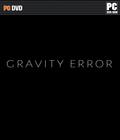Manipulating the environment to your advantage has been a good device for some of the better puzzle platformers. And Yet It Moves let you rotate the whole world, so you can open up pathways while Echochrome lets you play around with perspective to reach the exit. Gravity is another element that has proven to be an appealing part of puzzle-solving, with games like VVVVVV. The same can be said for Gravity Error, a new puzzle platformer that is enjoyable from beginning to end.
There's a story, but you'll never know the details unless you read the description on the game's Steam page. You play the role of Force, a simple square living in the epicenter of a universe surrounded by orbs on their own rotational path. One day, the gravitational field stops working, causing the orbs to fall out of sync and out of place. Since you're the de facto caretaker of those orbs, you make it your mission to get them all back.
Each level has you stuck in a room where you have to have to collect three orbs before reaching the exit. Collecting all of them isn't mandatory if you simply want to leave the level, but you will need at least 110 orbs to open access to all five worlds. As expected, Force can run and jump, and while he is a little speedy, his leaps don't reach tremendous heights. Luckily, each stage gives you a limited number of arrows that you can place anywhere. Touching them activates gravity in that direction, so an arrow that points left, for example, makes gravity shift so Force falls to the left. Placing them in the right spots comes in handy, since most rooms are filled with dangers such as saws, spikes, and weights.
Based on those basic mechanics, it sounds as if Gravity Error wants to emulate something like Super Meat Boy in forcing you to execute things precisely to make it out of the stage, never mind doing so with all of the orbs in your possession. However, nothing is further from the truth. With the exception of a few stages later in the game, there's plenty of leeway for you to place arrows in the general vicinity and still get the orbs and reach the exit. The same goes for platforming, which can only feel tricky since Force doesn't stop on a dime. Momentum also plays a big part, as falling in one direction from long distances means you'll bounce a bit when you hit an arrow that points in a different direction. There's enough room for error that you'll generally be fine.
Interestingly, the puzzles aren't difficult. For the most part, you'll be able to figure out the solution when you see the room, and while reaching the exit in every stage is child's play, getting all three orbs isn't that hard. You will fail in almost all of the stages at least the first time out, but respawns are instant, and the transition from the run to editing arrow placement is also fast. If anything, the whole experience is relaxing since there's no time limit that forces you to think fast, and it remains fun since most of the puzzle platformers either try to tax your brain or emphasize twitch reactions. The only thing you have to worry about is remembering that your directions are relative to gravity. For example, with gravity facing right, hitting left makes you jump instead of moving down, like you'd expect.
Some of the design choices, however, make the game so relaxing that it can disappoint a few people. Completionists won't like to find out that collecting all of the orbs doesn't provide a reward. Outside of the related achievements for doing this, you don't get anything in the game for catching them all. Those looking for some kind of competition will also lament the fact that the game doesn't keep track of anything. There's no scoring system in place, and there's no timer to show off how well you completed a level or how quickly you did it. This really is a situation where you take satisfaction in completing a stage without having to let everyone know about it.
Puzzle games generally don't go for an overly flashy presentation, but what you'll get in Gravity Error is beyond simple. You've got a monochrome background that has a nice grid painted on it, making it perfect for figuring out where to place arrows. Everything else is either black or white, so it stands out against the different background shades of blue and gray. You will notice a little flourish when picking up orbs or dying, as there are plenty of particles seen in both situations, but other than that, the graphics are clean. On the audio side, effects are minimal, but the soundtrack drives everything on this front. Each tune is rather mellow and ethereal, which is fitting for the game's minimalist appearance. There aren't too many songs to listen to, but they blend together so well that you won't notice the short length of the overall soundtrack.
Gravity Error is a basic but fun puzzle platformer. It nicely balances challenging puzzles with mechanics that are forgiving and eager to let you try again. It is short, however, and there's no real reward for completing everything the game has to offer, but it is still an enjoyable experience that puzzle platforming fans should check out between bigger titles.
Score: 8.0/10
More articles about Gravity Error













 Gravity Error is an indie 2D puzzle/platformer about changing gravity. Guide Force in his quest for emotional stability and avoid being crushed. Solve the puzzles in multiple creative ways.
Gravity Error is an indie 2D puzzle/platformer about changing gravity. Guide Force in his quest for emotional stability and avoid being crushed. Solve the puzzles in multiple creative ways.



